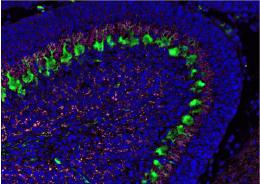Planned program and time schedule
-
Day 1. Wed, Sept 11
12.00-14.00 h arrival / check-in / snacks
Welcome and Session 1: Normal cerebellar development
14.00-14.15 h Welcome: Simone Mayer/Lena Kutscher
14.15-15.00 h Mary Beth Hatten, The Rockefeller University, USA: Molecular Control of Cerebellar Circuit Formation
15.00-15.45 h Alex Joyner, Memorial Sloan Kettering Cancer Center, USA: Functional implications of spatially defined molecular subclasses of cerebellar excitatory neurons15.45-16.15 h Coffee break
16.15-17.00 h Sumru Bayin, University of Cambridge; Gurdon Institute, UK: Unraveling mechanisms of cerebellum development and regeneration
17.00-17.20 h Selected Abstract: Daniel Goldowitz, University of British Columbia, Canada: Cerebellar development from the perspective of Pax6 and gene regulation17.30-18.30 h Welcome reception
-
Day 2. Thur, Sept 12
Session 2: Transcriptional control of cerebellar development
09.00-09.45 h Kathy Millen, Seattle Children’s Hospital, USA: A human-centric view of cerebellar development is required to understand human cerebellar disease
09.45-10.30 h Mari Sepp, University of Heidelberg, DE: Cellular Development of the Mammalian Cerebellum through an Evolutionary Lens10.30-11.00 h Coffee break
11.00-11:45 h Justus Kebschull, Johns Hopkins University, USA: Evolution of the cerebellar nuclei
11.45-13.15 h Lunch
13.15-14.00 h James Li, University of Connecticut, USA: Single cell and spatial expression profiling to decipher the parcellation of the cerebellar cortex
14.00-14.20 h Selected Abstract: Valentina Cerrato, University of Turin, IT: A single cell atlas to unveil the diversity of mouse cerebellar astrocytes: insights into their molecular identities, development, and functions14.20-15.00 h Poster flash talks
1. Parthiv Haldipur
2. Giacomo Turrini
3. Tetsuya Yamada
4. Manjari Anant
5. Beatrice Durand
6. Nicole Amberg
7. Benjamin Lepennetier
8. Tamiris Borges Da Silva
9. Davide Aprile
10. Theresa Kagermeier
11. Luca Tiberi
12. Chris Meulenbroeks
13. Alicia Eckhardt
14. Srijita Banerjee
15. Bertrand Duvillie15.00-17.00 h Poster session
17.30 h City tour, for those who registered
-
Day 3. Fri, Sept 13
Session 3: Models of cerebellar development and disease
09.00-09.45 h Giorgia Quadrato, University of Southern California, USA: Modeling human cerebellar development and disease at single cell resolution with organoids
09.45-10.30 h Simone Mayer, Karlsruhe Institute of Technology, DE: Cerebellar organoids as a model for pontocerebellar hypoplasia10.30-11.00 h Coffee break
11.00-11.45 h Vincent Cantagrel, Institut Imagine, FR: Modeling human cerebellar development and malformations using cerebellar organoids
11.45-12.05 h Selected Abstract: Christin Schmidt, University of San Francisco, CA, USA: Chromosome 17p13 deletion in human cerebellar development and Group 4 medulloblastoma oncogenesis12.05-13.15 h Lunch
13.15-14.00 h Esther Becker, University of Oxford, UK: Modelling cerebellar diseases using iPSC-derived organoid models
14.00-14.45 h Teresa Silva, University College London, UK: Investigating trisomy 21-associated cerebellar developmental alterations using human cerebellar organoids14.45-15.15 h Coffee break
15.15-16.00 h Lena Kutscher, German Cancer Research Center, DE: Neurodevelopmental principles underlying pediatric brain cancer
16.00-16.45 h Myron Evans, Seattle Children’s Hospital, USA: Epigenetic regulation of cerebellar development and tumorigenesis16.45-17.15 h Break
17.15-18.30 h Final discussion
19.30 h Conference dinner for all participants, Kulturbrauerei Heidelberg

